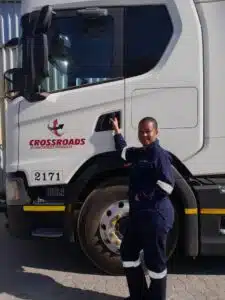The republic of Namibia is a country in Southern Africa. This sub-Saharan country is one of the driest and least populated areas in the world. Although the nation borders the Atlantic Ocean, it depends on groundwater for residential and commercial needs.
The top economic sector is the mining industry which provides the nation with one quarter of its revenue. Namibia is the fourth largest producer of uranium in the world. Tourism is also a large part of the nation’s economy and sport trophy hunting is a growing part of the attraction.
Jo-ann Van Wyk lives in Namibia in a village called Witvlei, a town where trucks stop before crossing the border into Gobabis. She dreamed of driving one of the big trucks and earning a living so she could support her son. “I was looking for a job I will enjoy, and trucking was always on my mind,” she said.
After learning about the Women In Trucking Association she received a scholarship from the foundation to attend truck driving school. She was the only woman in the class and although her trainer is supportive, most of the men in the class resent her and tell her to stay home.
The CDL schools in Namibia are not regulated and Jo-ann said they are often not safe for women “being a woman generally is not easy because of cultural beliefs, it makes you vulnerable to many types of abuses.” In Namibia, nearly one third of women (age 15-49) endure violence and domestic abuse, as many men feel that this is acceptable treatment of their spouses or partners.
Jo-ann has experienced her share of challenges, as twenty years ago she was diagnosed with HIV. She was chased out of school because the stigma of the disease. All pregnant women are tested for the virus and if found positive, they are blamed for spreading it to their partners. The Ministry of Health has estimated that nearly sixteen percent of women and eleven percent of men are HIV positive.
After doing her research about living with HIV he learned it, “actually it wasn’t a death sentence all you need is treatment and support.” Jo-ann started a support group for women living with the virus because she wanted, “women to get out of it and become more independent, because most of us got (infected) while being at home and we rely on (our) man.”
After receiving the tuition grant from Women In Trucking’s foundation she was able to get the training she needed and has learned to drive a tanker truck. She must now finish her on the job training and work toward a permanent contract.
Jo-ann has much higher goals, however, as she is planning to start her own truck driving school. Since there are no standards for training, she would like to create the curriculum and introduce certified training as a standard. She also plans to develop a CDL manual, which is not currently available in Namibia.
Her goal is to empower women and help them become independent, so they aren’t subject to the culturally acceptable treatment by the men in their lives. Jo-Ann’s goal, “will ensure that I get as many women (as possible) out of poverty (and) gender-based violence, especially those who want to go into trucking and don’t know where to start.
“I want to tell others never give up,” Jo-ann adds, “it took me 10 years … to become a qualified dangerous goods driver.” She was unsure if she would qualify for the tuition grant, and she said she prayed a lot because she knew it would give her hope.
With the help of the women in trucking association, Jo-ann is now self-sufficient and free from gender-based violence. She is thrilled to share that she now has, “a bank account and a salary.” She added, “I can bring food to the table.”
Jo-ann is one woman who has benefitted from the generosity of doners who fund the Women In Trucking Scholarship Foundation. Your dollars can change a woman’s life. Visit www.womenintruckingfoundation.org and help someone like Jo-ann Van Wyk.


